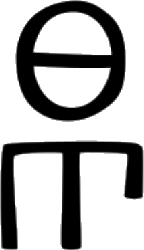DATING ATLANTIS

Solon's initial speech to the Egyptians, which caused them such humour [Tim. 22ab], and which led to the priest's revelations about Athens' glorious past, reminds one of Herodotus' statement about the Egyptian response to Hecataeus and himself giving their genealogies [2.143b]. The 9,000 years is thus not especially relevant other than that it is a greater span of time than the 8,000 years separating the dawn of Egyptian civilisation from Solon's meeting with the priest. Plato's motives for providing such an early date for his Athens-Atlantis war are dealt with elsewhere. This section covers attempts to interpret the 9,000 years as something other than the plain statement in the text.

These interpretations mainly take the form of an identification between the Sea Peoples who ravaged Egypt and the Middle East at the end of the Bronze Age or the supposed catastrophic end of Minoan civilisation with Plato's Atlantis, and generally posit that the 9,000 years is either an error for 900, or else represents a reference to "lunar years" (months).

However, this is invalidated by Plato: his sole purpose in dating ancient Athens and Atlantis to such a remote time was that they both arose before civilisation appeared in Egypt (selon Plato, 1,000 years thereafter). Atlantis, therefore, can be found neither on Crete nor Santorini. It is surely impossible to arbitrarily reduce Plato's 9,000 years without putting forth a similar reduction to the 8,000 years of Egyptian - at the very least Saïte - history [Tim. 23de]. Either to maintain the 9,000 years as indisputable truth or to suggest a reduction based upon the figure smacks of cherry-picking evidence.
Anyhow, the question of the age of Atlantis and Athens is moot: Egyptian civilisation entered its dynastic era shortly before 3000 BC, with evidence of settlement at Athens dating to the Middle Neolithic in the preceding millennia.

THE SIGNIFICANCE OF 9,000
Lycurgus was said to have "fixed the number of Spartan citizens at 9,000, each with a plot of land," a tradition related by the much later author Plutarch [Life of Lycurgus 8.3], which is perhaps a prototype of Plato's description of the allotment of the plain of Atlantis [Crit. 118d-119a]. It is also, however, quite probable that this tradition specifying 9,000 allotments postdates Plato as it is not mentioned by writers such as Herodotus, Xenophon or Aristotle.
9,000 is also a significant figure in Athenian history: during the 1st century BC, Cornelius Nepos, in his biography of Miltiades [5], suggested that the Athenian commander had 9,000 Athenian hoplites in his forces which defeated the Persians at Marathon.
Given Miltiades' later troubles, as well as the possible Spartan references, it is well worth bearing in mind Plato's only other use of the number nine thousand in his work. It appears in the Phaedrus [256e-257a]. In describing the fates of the souls of those who have enjoyed erastes-eromenos relationships with those who haven't (who are subsequently given to - at best - a penchant for military rule), Plato has Socrates state: -
Salvation for Plato's Socrates, it seems, comes through pederasty. Make of that what you will.
